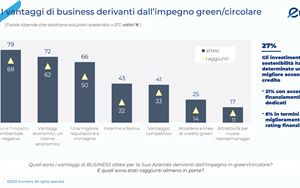(Finance) – More and more Italian companies and their management are aware of the applications of the circular economy and are proving to be very sensitive to it. 62% of companies declare that they are familiar with the concept of circular economy, a marked improvement compared to 41% last year. This is what emerges from2023 edition of the CleanTech Observatory entitled “Environmental Sustainability, Circular Economy and Energy Efficiency in SMEs and Large Enterprises” made in collaboration with Innovatecthe results of which were presented by Circularity, an innovative SME active in the field of sustainability and the circular economy. The objective of the study was to investigate the sensitivity and behavior of companies in the field of environmental sustainability, circular economy and energy efficiency. The second edition of the research – conducted by Eumetra on behalf of Innovatec and Circularity – was carried out by interviewing a representative sample of 450 SMEs and large Italian companies (from 10 to over 250 employees) with the aim of providing a snapshot of the path towards a sustainable development undertaken by Italian companies, green investments undertaken and their future objectives in terms of sustainability and circular economy.
“This second edition of the CleanTech Observatory – he comments Camilla Colucci, co-founder and CEO of Circularity – shows several figures that are growing compared to 2022, which is certainly encouraging, even if there is still a lot to do. The results of the survey confirm that Italian entrepreneurs are aware that sustainability is essential today for their business to last. It is clear that a paradigm shift requires structural intervention, a redesign of business processes, significant investments and above all skills. For this reason, Circularity was created to support Italian companies in this transition process, through digital tools, such as the Circularity Platform, as well as the provision of training courses on ESG topics and the activation of technical-strategic consultancy services”.
Economic and competitive advantages for companies – The interviewees declare that they have acquired a greater awareness of the concrete benefits that investments in sustainability projects can bring, also from an industrial point of view. As emerges from the data collected by the survey, in fact, 62% of Italian companies, almost 2 out of 3, declare that investments in sustainability and in the circular economy have generated a greater economic return. Not only that: 50% of the companies interviewed declare that they have improved their reputation and 33% add that they have also obtained a competitive advantage over their competitors. A growing commitment in recent years on circular economy issues that the Italian industrial fabric does not want to diminish in the future: almost half of Italian companies, 44%, intend to invest even more in sustainability projects in the coming years , while 37% say they will invest more in circular economy projects.
The number of Italian companies investing in the circular economy is increasing – Italian companies that have invested in the circular economy double in one year, but the figure is still low (16% of companies in 2023, compared to 9% in 2022). The figure is significantly higher in large companies which in 40% of cases – therefore almost half – have made investments to become more circular. The investments mainly concern the procurement of recycled materials (64%) and the recycling of production waste (61%), while only 14% of the investments is destined for industrial symbiosis projects, a further sign of how circularity is always more perceived as an essential element of the Italian industrial fabric. The increase in investments in this area is proof that companies are starting to believe in the usefulness of the circular economy.
Lack of skills is the main obstacle – The Observatory also focuses on the barriers that block investments. For almost half of the companies interviewed (47%) it is the lack of skills in the company that hinders the commitment to sustainability, and the figure is up on the 36% recorded last year. For 41% of companies, the legislation is still too complicated (in 2022 16% of companies declared it), even more so on circularity issues. Technology, on the other hand, does not seem to be a problem: only 12% of the sample complains about its lack.
